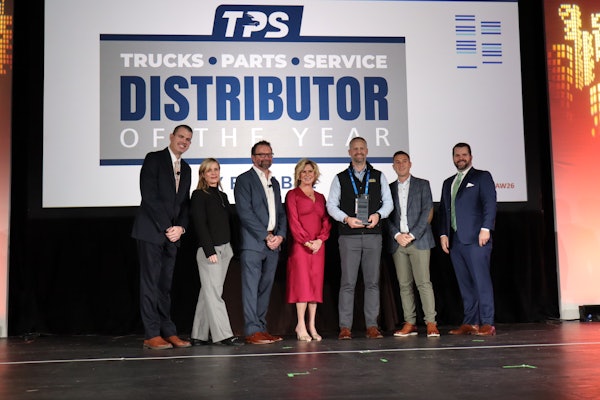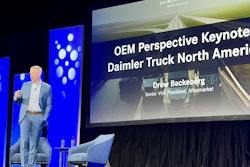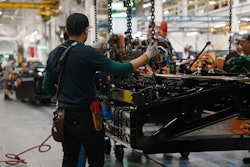Everyone is looking for opportunities in this recessed market, whether it be growing sales or reducing costs. With the independent aftermarket seeing sales down by 15 percent or more in some regions, looking to sell into other markets just makes good sense.
Other markets usually means looking for prospects a few counties over or perhaps attacking a new market segment. But sometimes those ambitions lead to setting sights a little further, if not higher, such as looking to mine sales opportunities in other countries.
It’s a viable strategy, but it’s not for everyone. The barriers to entry are high and the risks are steep.
But for those who have successfully gone global, it has become an essential part of their business plan and diversified their sales portfolio to better weather economic cycles.
“I can honestly say that if we didn’t have the global market to support our business we may not be speaking to you today as our domestic business has really felt the effects of the current economic recession,” says Rob Bramlette, president of Fleet Truck Parts in Calumet Park, Ill. “Running our business as a domestic-only business is just not possible in today’s economic climate.”
Bramlette is an exception to the typical distributor in many ways, and that’s been the key to Fleet Truck Parts’ success in export sales. They made a commitment to pursuing international business and they dedicated the resources to making it successful.
“Many distributors are looking into the opportunities [of international sales] as expansion possibilities. Exporting requires specialization though, and many are not willing to make the necessary investment,” says Todd Kindem, ArvinMeritor’s director of sales and marketing, Commercial Vehicle Aftermarket.
WORLD WIDE WEB
While the most effective way to break into overseas sales is through personal contacts, some distributors report business coming to them unsolicited through their Web site.
It is, after all, called the World Wide Web for good reason. Generally, an importer, either domestically based or in another country, will scour the web looking for the best deal on truck parts for clients to export. So an online presence is essential, or you won’t even be on the radar screen.
“I believe it [the Internet] has helped importers in other countries locate manufacturers and distributors willing to sell North American parts more so than helping exporters find customers,” says Kindem. “Relationships, trust and reputations are what the export businesses rely heavily on.”
Of course, international sales aside, having a full-featured Web site just makes sense in today’s market, yet distributors have not flocked to this medium.
“I don’t see a whole lot of Web sites out there set up by distributors who are taking advantage of an online distribution-type model,” says Don Orrell, global aftermarket liaison for Bendix Commercial Vehicle Systems. He draws a distinction between consumer ecommerce and truck parts sales in that the latter generally requires more immediacy to complete repairs and limit downtime. But for less time-sensitive orders, there is an opportunity for distributors to sell via the Web – both domestically and internationally – as there can be cost savings versus more traditional sales methods.
However, it requires more than just a few Web pages about the company and its product offerings. You need to be set up to do online commerce, like Fleet Truck Parts. Customers need to be able to browse a storefront with inventory updates that are as real-time as possible, they need to be able to fill their virtual basket, choose their shipping terms with realistic freight pricing and be able to complete the transaction with a payment.
But even after doing all that, don’t set your expectations too high. A ‘build it and they will come’ outcome is not guaranteed.
“The Internet is a useful tool for disseminating information, but don’t expect to crack into a foreign market just because you have a great Web site,” says Chris McCleave, president of Buy-Rite Truck Parts in Mississauga, Ontario. “Our export customers use our Web site as a support mechanism for the business that we are already doing together.”
MAN ON THE GROUND
Doing business in truck parts always has been, and always will be, about relationships, and it’s no different on the global scale. The best strategy for finding international sales opportunities is building personal contacts with importers to or in the countries you want to reach.
“The real challenge is, ‘If I know that they [international customers] are out there, how do I reach them?'” says Orrell. “And that’s where it’s somewhat a barrier to entry because you have to know somebody or establish a relationship with somebody who can be your man on the ground. Because if you don’t have that man on the ground out there, you’re really out of touch with what’s going on in that market. That’s one of the pivotal components in if you’re going to be successful or not. Do you have a strategic partner out in that market where you’re trying to sell who is going to help pull that product through to the end users and get the parts where they need to be?”
Networking and attending industry functions is a proven way to forge these relationships. For instance, Orrell points out, there were at least half a dozen Russian distributors at the last Heavy Duty Aftermarket Week who were looking to establish partnerships with manufacturers or distributors.
And that’s typically the arrangement for domestic distributors. They create liaisons with international partners to mine global markets, or team with someone in their own country who specializes in exports.
“Very few aftermarket distributors export directly. It is more typical for an aftermarket distributor to sell to a sales agent or parts broker in their home market,” says McCleave. “The sales agent or parts broker would, in turn, export the parts to the offshore market. Certainly the aftermarket distributor is reducing its risk by doing business in this manner, but they also are sharing profit with another party who is positioned between them and the end user.”
DON’T GET BURNED
It is even more important than normal to know who you are doing business with when it comes to exports. And even in the best of relationships, always exercise caution.
Not only should you insist on getting payment in advance, but if you need to order product to fill the order, get payment to cover that in advance so you’re not stuck with the inventory should the deal fall through. Some of the product being requested may be nearly obsolete or at least not in high demand in the U.S., so if it gets stuck on your shelves, it may stay there a long time.
Marc Karon, president of Total Truck Parts in West Palm Beach, Fla., says they require full payment in advance before they track down products to fill orders. “You don’t want to go out and order a bunch of oddball stuff and then have the guy never show up and it sits on your shelves,” he says.
While the Internet has made global buying and selling so much easier, it also affords anonymity that can be abused for fraud. Just as you shouldn’t provide your banking information to the sender of an unsolicited e-mail claiming to be the exiled ruler of a foreign land seeking your help and willing to share his/her vast fortune, don’t be too trusting during foreign business deals either.
“Get your money uprfront!” advises Bramlette. “Even if it’s a good, long-time customer, wait for the funds to clear in full, then wait a little bit longer and then let the product ship.
Make sure your customers know that order processing and ship times may take a little longer until you’re sure funds have cleared the timeframe in which any fraudulent activities may have taken place. Don’t accept out-of-country credit cards and don’t give out wire information to just anybody who wants to place an order.”
McCleave says while there are nuances and special considerations trading between neighboring countries, such as the U.S. and Canada, it becomes much more complex when exporting to more distant markets.
“Although our common border means that we have to address issues such as currency exchange, brokerage, duties and freight, our countries still share a common business ethos,” McCleave says. “Overseas exports involve all of these issues plus a whole lot more, not the least of which is negotiating an acceptable payment method.”
For more information on the legal aspects of international trade, see the sidebar “Keeping it Legal” on page 22.
MARKET CHOICES
While there are sales opportunities in virtually every country, effectively choosing the right markets to go after requires knowing what products are in demand there.
Orrell says distributors need to consider the truck platforms in the markets they want to enter.
“There are pockets of opportunity, but I think sometimes they are overstated because if we look at the global market and then break it into regions, there are different truck platforms that dominate those markets,” says Orrell. “In Western Europe, you’re not going to see any [FMVSS] 121 U.S. air-braked trucks on the road, not a one, because they’re not legal to run there in that configuration. So, obviously, there’s not a whole lot of opportunity to export Bendix parts to Germany.”
He adds that the brake requirements in Asia also are different from both the U.S. and European markets.
Another consideration is that some manufacturers already are selling to a distribution base in foreign markets, requiring distributors to be more resourceful in finding outlets fowr their products.
According to Karon, some manufacturers have chosen distributors in other countries that they will sell exclusively through, just as in the U.S., but this still can be an opportunity.
“That leaves a whole plethora of other people who want to sell or can’t get the product line, and they’re trying to figure out how to do it,” says Karon. “So they’re coming to the United States either through brokers or by themselves and they are exploring how to get those products into their country.”
Adds Tim Kraus, president and COO of the Heavy Duty Manufacturers Association, “There are numerous opportunities for distributors who have relationships with manufacturers that have not branched out internationally; typically small suppliers.”
Of course, there will be expected hurdles as well, such as language and cultural considerations that will need to be overcome.
“Language, customs and business culture knowledge are essential to entering any new market,” says Kraus. “One cannot risk investment into a venture without understanding all parameters of the market you are pursuing.”
The barriers and risks are many, but international sales can be a way to grow revenue and bolster the bottom line.
Like any business venture, it requires a commitment to make it successful. If you are willing to put the required resources into it – a dedicated person or department, a full-service Web site, research into all applicable laws and regulations and a grasp on the languages and customs of the countries you want to enter – you can strengthen your company’s portfolio in exciting new markets.






